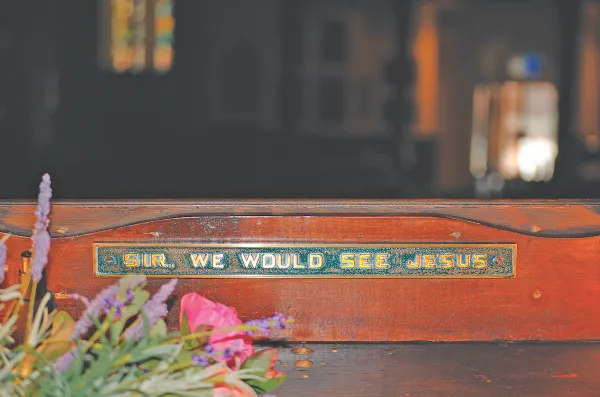How should we then engage? [3/3]
![How should we then engage? [3/3]](/content/images/size/w1200/2025/07/ChatGPT-Image-Jul-6--2025-at-03_50_34-PM.png)
Engaging Without Enflaming
In Part 1 of this series, I argued that the church must resist two equal and opposite dangers in our deeply polarized cultural moment: unloving criticism and uncritical love. We’ve drawn sharp divisions—not just as a nation, but tragically, even within the church—around policies, politicians, and parties. We’re fire-hosed by an abundance of poor examples of how to talk about these issues online and in the media, but we see tragically few good ones.
Meanwhile, far too many Christian leaders remain silent altogether.
In Part 2, I tried to model faithful engagement—not from a place of outrage, but from a desire for biblical clarity. I compared President Trump’s language to the arrogant boasting of King Nebuchadnezzar—not to pick a fight, but because I see in him a deeply troubling echo of the kind of pride that once toppled a king. And given our current political moment, I’m not sure our country would survive a similar fall.
Here in Part 3, I want to go a step further—not only to share my heart that we as Christians engage political discourse with grace, kindness, patience, and truth, but to offer a few practical suggestions for how to do it.
Two Kinds of Division
When we think about political division in the church today, we usually think of left vs. right. And there’s certainly plenty of that. But what concerns me just as much—perhaps more—is a deeper division in the Church, where some Christians, and Christian leaders seem determined to over-engage, while others won’t engage at all.
It reminds me of C.S. Lewis’ introduction to The Screwtape Letters, where he writes:
“There are two equal and opposite errors into which our race can fall about the devils. One is to disbelieve in their existence. The other is to believe, and to feel an excessive and unhealthy interest in them. They themselves are equally pleased by both errors and hail a materialist or a magician with the same delight.”
We fall into a similar trap today. Some Christians—pastors included—are all-in, fully immersed in political identity, speaking as if one party or candidate holds the keys to the Kingdom of God. Others retreat entirely, afraid of offending or being misunderstood, choosing silence even when moral clarity is needed.
Just as we've been divided over conservatism and progressivism, we've also become divided over whether Christians should even speak into politics at all.
But while obsession isn't neutral — neither is silence.
We’ve all seen people who are far too consumed with politics—who treat it like religion, where every election becomes a kind of second coming or final judgment. But we must also recognize that disengagement can be just as dangerous. Too many Christians know they shouldn't pour gasoline on a fire—but need reminding that walking away from a fire doesn't put it out either. In fact, refusing to speak truth into the flames may only allow them to burn hotter.
As Christians—especially those in leadership—we need to be wise, courageous, and humble in how we engage the political world. Not to baptize our candidates or demonize the opposition. Not to parrot party lines or chase clout. But to speak the truth regardless of which “side” happens to agree or object, to pursue (Biblical) justice, and to shepherd God’s people through a cultural moment that is both complex and volatile.
And if we, as pastors and Christian leaders, fail to model what healthy, gracious, and biblically rooted political engagement looks like, we leave our people with few options. In the absence of discipleship, they will take their cues from the loudest voices online, the angriest commentators on cable news, or the tribal instincts of their political camp. If the Church won’t show a better way, the world will gladly fill the vacuum.
In this climate, Christians must approach politics neither with worship nor withdrawal. And no, it’s not enough to share a clever meme about Jesus being a lion rather than an elephant or donkey. Faithful engagement doesn’t mean playing neutral, either— trying to act like Switzerland in a time when a veritable civil war is unfolding around us.
We (hopefully) know we can’t throw gas on the fire.
But we can’t walk away from the fire either.
So where does that leave us?
It leaves us with a call—not to neutrality, but to maturity.
Not to fire-breathing, and not to fleeing—but to faithfulness.
The church doesn’t need more culture warriors.
And it doesn’t need more cultural escapists.
It needs disciples.
It needs shepherds.
It needs ambassadors of Christ—men and women who engage the world not by mirroring its outrage or matching its apathy, but by embodying the courage, humility, and hope of a better Kingdom.
Where Do We Start?
Let’s be honest—there’s only so much “how-to” that can fit into a single blog post... But one thing is clear: the kind of engagement we’re talking about doesn’t happen by accident. It takes intentionality. It takes practice.
And it starts with posture—how we position our hearts before God and others, long before we ever open our mouths (or our browsers).
So without further ado - here are three practical suggestions:
1. Before You Panic — Pray
Our first instinct in a crisis is often fear. When we see leadership failures, cultural upheaval, or political volatility, we imagine worst-case scenarios and start scrambling for control. But panic is not a fruit of the Spirit. Panic is what happens when we forget who sits on the throne.
“The fruit of the Spirit is love, joy, peace, patience, kindness, goodness, faithfulness, gentleness, and self-control.”
— Galatians 5:22–23
Self-control means we don’t have to react instantly. We don’t have to match the world's outrage or anxiety. Instead of letting fear drive us to react, we can let it drive us to pray.
Prayer is not passivity. It’s not a cop-out. It’s the Christian’s first move toward faithfulness. Prayer is how we remember that the Kingdom of God does not rise or fall based on earthly rulers. It’s how we acknowledge God's sovereignty and ask Him to move. It slows us down. It reshapes our hearts. And it reminds us that we are not alone, not forgotten, and not in charge—God is.
If there was a list of Top-10 most-memorized verses from the Bible, Philippians 4:6-7 is probably in there somewhere, and for good reason.
“Do not be anxious about anything, but in everything by prayer and supplication with thanksgiving let your requests be made known to God. And the peace of God will guard your hearts and your minds in Christ Jesus.”
— Philippians 4:6–7
So before you post, before you argue, before you panic—pray.
Let prayer shape your heart before fear shapes your response.
2. Before You Open Facebook — Open the Good Book
We live in a world of instant opinions. We scroll, share, react, and vent—often without pausing to reflect. But when we fill our minds with noise, outrage, and tribalism before we fill them with truth, we’re letting the world shape us before the Word grounds us.
God’s Word is not just ancient wisdom—it’s living and active. It discerns our hearts. It re-calibrates our priorities. And it has more power to shape culture than any hot take ever will.
“For the word of God is living and active, sharper than any two-edged sword… discerning the thoughts and intentions of the heart.”
— Hebrews 4:12
The problem isn't just that we're too loud—it's that we're often unformed. We post before we pause. We vent before we seek wisdom. We’ve become a “Ready. Fire. Aim.” society, launching our thoughts without aiming them through prayer or Scripture. But wisdom begins with listening—especially to God.
“A fool takes no pleasure in understanding, but only in expressing his opinion.”
— Proverbs 18:2
“When words are many, transgression is not lacking, but whoever restrains his lips is prudent.”
— Proverbs 10:19
The Book of Proverbs doesn’t say “thou shalt not post,” but it does call us to pause — to reflect before reacting, to seek wisdom before expressing opinion, to be more shaped by Scripture than by headlines or hot takes.
So before you go online to get your perspective—or to give it—open Scripture to get your foundation.
Let the Psalms steady you before the comment section provokes you.
Let the Gospels center you before the news cycle tells you what to fear next.
Let God’s voice be louder than the algorithm’s.
3. Before You Take a Stand — Fall to Your Knees
We live in a culture obsessed with taking stands.
“I stand with this country!”
“I stand for that cause!”
“These lives matter!"
"Justice for that group!”
And conviction is important. Courage is needed. But as Christians, we’re called to lead with dependence, not defiance. Before we plant a flag, we need to bow in surrender.
Jesus didn’t teach His disciples to storm the palace—He taught them to pray.
In the garden of Gethsemane, before facing the cross, Jesus didn’t stand tall—He knelt.
“Humble yourselves, therefore, under the mighty hand of God so that at the proper time He may exalt you.”
— 1 Peter 5:6
Before we speak, before we march, before we argue—we need to ask:
Have I knelt before the Lord first?
Is this cause righteous, or just loud?
Am I seeking true Biblical justice in humility, or am I joining a mob in venting frustration wrapped in sinful pride?
Falling to your knees is not weakness. It’s worship.
It’s how we make sure we’re following the King—not just chasing our own convictions.
Or chasing the world's convictions.
Bowing is how we allow God to purify our motives and align our hearts before stepping into a broken world.
So yes—Speak the truth. Yes – take a stand.
But before you do, fall to your knees.
A Final Word (for Now)
If you’ve made it this far—thank you. I know this post has already gone long, and if we’re honest, we’ve only scratched the surface. Even in the “how-to” section, we’ve stayed fairly high-level. We’ve talked about posture more than policy. About internal formation more than external tactics.
And that was intentional.
Because if our hearts aren’t grounded— being "right" or "wrong" is of little consequence. If we don’t start from a place of prayer, Scripture, and humility—then no amount of strategy or savvy will make our engagement redemptive. It will just be louder noise.
That said, in future posts I hope to dive deeper into more concrete, practical questions:
- Where (and when) should Christians speak up?
- How do we discern when silence is wisdom vs. when it’s cowardice?
- What does faithful public presence look like in a digital age? Can you do actual discourse in 140 characters?
Coming soon...
One of those upcoming articles will explore a tension I see often: the tendency to universalize personal experience. Just because something happened somewhere doesn’t mean it’s happening everywhere. But the reverse is also true—just because it hasn’t happened to you doesn’t mean it isn’t happening at all. That piece, tentatively titled “Here, There, or Everywhere?”, will be a call to humility and discernment—especially in how we listen to and speak about cultural realities.
But for now, let’s start where we must: with posture.
Because before we try to shape the world, we must let Christ shape us.



